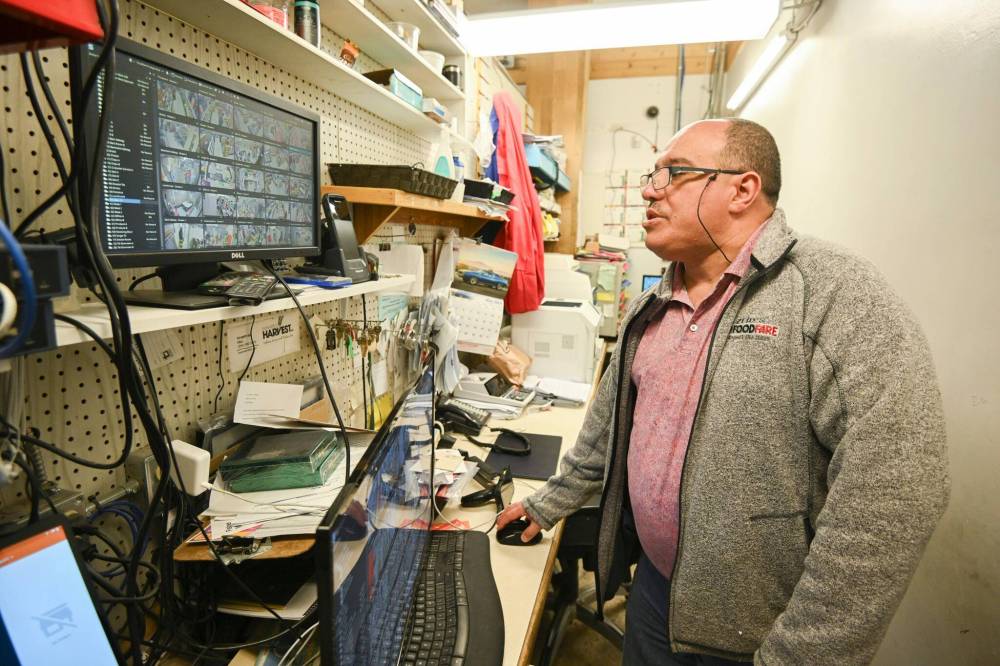
A police effort targeting a wave of brazen shoplifting that had tormented store owners pleading for help over the winter and spring is having a positive effect for some.
“It’s only been a couple of months, but it has made a difference for us,” said Munther Zeid, co-owner of local grocery chain Foodfare, which was repeatedly victimized by often-aggressive thieves.
“It’s not eliminated shoplifting, but it has reduced it.”
Mike Sudoma/Free Press Files FoodFare owner Munther Zeid, scanning security monitors installed at the 2295 Portage Ave. location, says the recent anti-shopliftiing push by the province and Winnipeg police has been a success.
Zeid said there’s been as much as a 50 per cent drop in thefts at his family’s Portage Avenue and Burnell Street store, where several violent high-profile incidents — including an alleged assault by an employee to stop a would-be shoplifter, reported assaults on staff that followed and an employee’s vehicle set on fire — generated headlines.
“They know that police are randomly stopping in, they’re coming for five, 10, 15 minutes, sometimes in uniform, sometimes without, so it’s made a difference,” he said.
Last November, the Winnipeg Police Service placed more officers near malls and downtown, where businesses raised concerns over increasingly violent thefts.
The province announced in May that it would direct $378,000 to the city to pay for the program, which relies on officers working overtime shifts. Police said the largely covert effort up to that point would become more visible in some areas.
And in July the provincial government added $1 million to extend the program, which focuses on three hot spots — the Exchange District, Osborne Village and the West End — through the end of August.
Business leaders say they’ve seen a drop in shoplifting amid a Winnipeg police initiative to curb retail theft, though it remains to be seen whether the apparent reduction has played out in long-term statistics.
Leaders in the business community are cautiously optimistic.
“It is making an impact though, of course, we want to see the data before we make any conclusive statements, but anecdotally, people are seeing the difference in their places of business,” Loren Remillard, president and CEO of the Winnipeg Chamber of Commerce, said Friday.
“It speaks to the value of deterrence, and that while we cannot solely police our way out of the issues that our downtown and other areas of the city are facing, we need to have policing as part of the solution, and that does include deterrence and enforcement.
“It’s got to be a robust solution, not a singular solution.”
The WPS was unable to provide the latest statistics on shoplifting Friday.
Data on calls for service in the three neighbourhoods under the microscope suggest reported property crimes have remained relatively consistent over the past 10 weeks, though it’s unclear how many charges have been laid or how many shoplifting incidents have been reported specifically since late May.
On July 10, police Supt. Cam Mackid said officers in the program had made more than 200 arrests on warrants or for shoplifting between June 8 and July 5.
Compared with the same four-week period in 2022, property crime dropped by significant percentages in each neighbourhood, he said.
He also noted at the time police recovered close to $9,000 in stolen goods during that period.
Justice Minister Matt Wiebe was not made available for an interview Friday. In a prepared statement, he said his office has received “significant positive feedback” from businesses, residents and community leaders.
“We are in constant communication with our partners in law enforcement about the impacts of this initiative and how we can continue to improve public safety in Winnipeg and build on the important progress that has been made” the statement read.
Remillard said he’d like to see the program continue.
“Our hope is that we do analyze the data, we do make sure we’re talking to community stakeholders that have benefited or been impacted by this initiative, and that where it’s working, we continue to ensure that that investment is made to keep what’s working going,” he said.
“My fear would be we have a short-term benefit to the program, and then the dollars cease, and it becomes a blip rather than a trend where we need the trend to go.”
Zeid said he supports the program and its effect, but he suspects would-be shoplifters have just gone elsewhere.
“By allowing the police to come in, it’s prevented shoplifting at our store, but I think it’s just moved… they’re just looking for another location where the police are not present,” he said.

Erik Pindera
Reporter
Erik Pindera is a reporter for the Free Press, mostly focusing on crime and justice. The born-and-bred Winnipegger attended Red River College Polytechnic, wrote for the community newspaper in Kenora, Ont. and reported on television and radio in Winnipeg before joining the Free Press in 2020. Read more about Erik.
Every piece of reporting Erik produces is reviewed by an editing team before it is posted online or published in print — part of the Free Press‘s tradition, since 1872, of producing reliable independent journalism. Read more about Free Press’s history and mandate, and learn how our newsroom operates.
Our newsroom depends on a growing audience of readers to power our journalism. If you are not a paid reader, please consider becoming a subscriber.
Our newsroom depends on its audience of readers to power our journalism. Thank you for your support.


